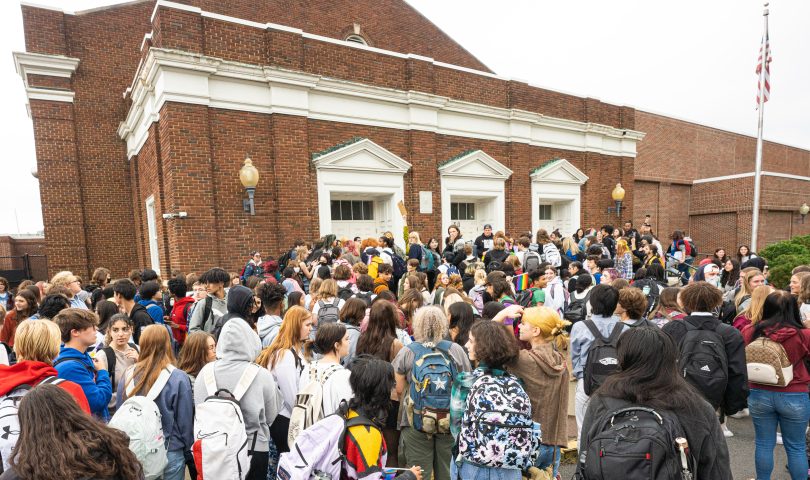After the batteries in the megaphones died, the crowd just yelled louder.
“Whose school is it?”
“Our school!”
“Whose school is it?”
“Our school!”
Collectively, the voices belonged to the 200 or so students from Morgantown High School – members of the LBGTQ+ community and others – who walked out in protest of the school’s removal of Gay Pride flags from classrooms last week.
It wasn’t an MHS rule. It was a Monongalia County Schools rule.
And it wasn’t meant to target a symbol of solidarity for one specific segment of Mon’s school population, Superintendent Eddie Campbell Jr. said.
The idea, he said of the directive that went out to school principals on Sept. 8, was to tamp the rhetoric in a divisive political year.
That meant no political statements or campaign posters on classroom walls, the superintendent said.
And no anything, really, he added, that might smack on personal or political activism expressed by a teacher on school property.
“We want our kids to learn to think for themselves,” he said.
The Pride flag, proponents say, goes beyond ideology.
Lonnie Medley, an MHS senior and member of the LBGTQ+ community, spoke in the school parking lot Wednesday, and before the county Board of Education during its meeting the evening before.
He’s also a person of color.
Being gay and Black in West Virginia, he said, carries enough weight.
“You’re disenfranchised twice,” he said.
Now, with the flag stripped from his school, he’s feeling lost all over again.
The flag, he said, is a beacon for students who might still be closeted – and who are definitely fearful of their present circumstances in school.
Mon’s BOE, meanwhile, pledged Tuesday night to be an ally for all students and plans to make diversity discussions a focal point of board meetings to follow.
The senior isn’t so sure.
“Then why aren’t they supporting our flag?”
Meanwhile, teachers who are members of the faculty senates of Morgantown High, University High and Clay-Battelle have drafted letters protesting the district decision.
Keeping the flags, those letters said, in effect, means buying just enough leverage to let students be who they are.
Sounds good to Quinn Rainbeau.
“I just want them to know what that flag means,” the 14-year-old MHS student said.
She too knows how it feels to be lost. She knows that LBGTQ+ kids commit suicide at rates higher than others in their age group.
Back in her native Florida, she said was relentlessly bullied over her orientation, which she began expressing in middle school. She moved to the Mountain State with her mother last year.
She knows why a young person might consider taking that way out, she said.
Gesturing in the direction of her school, she said adults in that building are speaking for her when they don’t even know her.
She turned a time-worn question around, in that regard.
“What is wrong with this generation?”
TWEET @DominionPostWV




